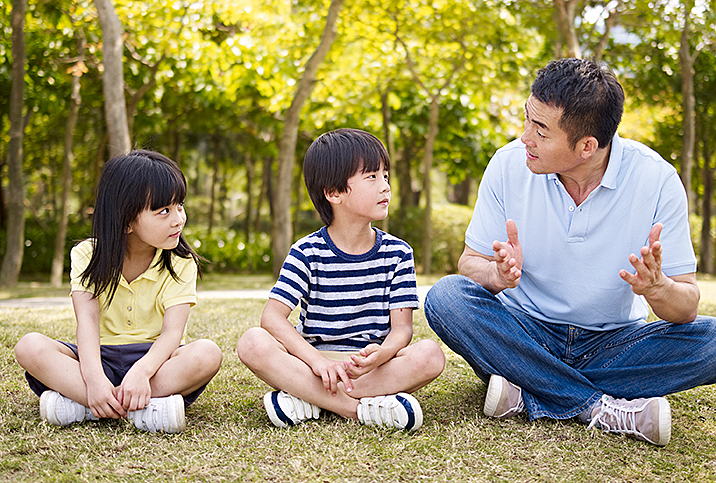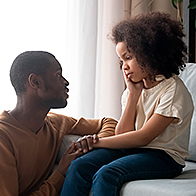How to Teach Consent to Your Kids

Whether you're a parent or not, you likely have a good idea of how your friends, community, family and state legislators feel about the birds and the bees, birth control and premarital sex. What might be surprising is how little thought these people give to teaching the topic of sexual consent. At what age do you start? What do you communicate? Where do you begin?
"Consent is a topic that kids should start learning about as early as possible and then should be built upon over the years," explained Elizabeth Schroeder, Ed.D., M.S.W., an expert in sexuality education with more than two decades of experience in educating, training and writing about the topic. "So, if you think about the end goal, which is to have healthy, respectful relationships in the future, then you go back to the beginning and you think, 'What do I need in order to get there?'"
Back to basics is probably a difficult place to mentally travel to for many adults—both men and women can be either perpetrators or victims of unwanted sexual interactions, and the basic human courtesies we owe and expect from one another have certainly become part of a greater conversation on how to treat people. For Schroeder, teaching the next generation correctly is the one-generation solution to the problem.
Fortunately, while children may not understand the complexities of intimacy and consent that adults wade through, they're taught fundamentals that can provide the perfect foundation for this knowledge.
'Consent is a topic that kids should start learning about as early as possible and then should be built upon over the years.'
"The very first thing we teach them is that hands are not for hitting; hands on your own body," Schroeder said. "That's the foundational stuff that we should be building on."
Even for the youngest children, these basics can be taught in simple, relatable terms with examples such as hugs. "Your friends might not want to hug," she said. "You don't know that unless you ask them that. You might not want to hug. Your friend won't know that unless you tell them that."
Schroeder emphasized that these lessons aren't one-and-done, but rather behaviors that require reinforcement.
"Parents and caregivers can't see it as an isolated one-chat deal like, 'Oh, we already talked about the consent thing. Now we're fine,'" Schroeder said. "Life and context and their social interactions change and mature and evolve as we change and mature and evolve."
The internet will fill in the blanks you don't fill in yourself
Avoiding the topic of consent isn't going to solve any problems—and could create more of them. One plan that doesn't work is following whatever you find on the internet, according to Schroeder. She called the internet a "mixed bag" of great information and misinformation—not to mention information that may not be age-appropriate.
"I don't want a 7-year-old learning about consent from porn. Right?" Schroeder asked.
She's quick to caution, however, that developmental milestones vary from person to person due to aspects such as puberty, when an adolescent starts dating and when those relationships become sexual. That's why it's important to talk to children early and continue the conversation as they age, she said.
'Your job as a parent is to get in there and keep talking with them about it.'
This process can also mean addressing topics at more difficult ages, even if high schoolers want to brush it off. You can't let them.
"I always say, 'Your job as a parent is to get in there. Your job is to get in there and keep talking with them about it,'" Schroeder said. "This is really nuanced, complex stuff. If you don't come back to it again and again, they won't get the full picture."
Schroeder has seen the results of teenagers not learning these lessons. It can create problems for people who feel their boundaries have been violated, and can also create intense guilt for people—often boys—who don't know they've done something wrong until after an interaction.
"As someone who taught undergraduate and graduate courses, I can't tell you how many times I had guys who would come to my office and be like, 'I had no idea that I was disrespecting my girlfriend's boundaries,'" Schroeder explained.
By this point, the damage is done. Many teens are sexually active, and by college, the statistics for rape cases are already significant, which is why Schroeder said waiting until freshman orientation to discuss consent is simply too late.
"I'm going to be talking with them in middle school so that they're ready for when they get into the situation," she said.
If you haven't gotten it yet, what Schroeder is saying is that there are no hard-and-fast rules to how and when we teach consent to children. However, there are guidelines she feels are important to help parents take the best tack and educate rather than scare.
Don't try to be cool
Lecturing and trying to be hip are bad strategies when talking to teens about consent.
"We are neither hip nor cool," Schroeder explained.
Don't try to pretend you understand what it's like to be a teen.
"The most important thing is to let young people be experts at being young people," she said. "I don't know what it's like to be 15 today."
She recommended crafting questions instead of lecturing.
"Ask them about the young people in their lives. Come to your child with a question," Schroeder said. "Young people are very well aware that there's an age gap and a generation gap. So don't try to hide it. Don't try to. So let them be the expert in something. It's very empowering and it can help open the doors and keep the lines of communication open."
Teach consequences through the lens of empathy
We teach kids very early on to be conscious of how hitting or name-calling can make other children feel. Consent should be taught with the same playbook. Schroeder said it's as easy as teaching them to ask.
"If you want to make sure you're not hurting this other person, ask them before you do something sexual; check in with them," she said. "If it's something you've done before sexually and you want to do it again, don't assume that you still have consent."
Schroeder added that empathy can be very difficult to teach. It has to be developed, so connect empathy to their feelings, she said. Empathy has to have a voice in the discussion even when factors such as peer pressure or social pressure are involved.
Focus on self-efficacy over social pressure
Empathy is a powerful tool when social pressures become more intense in adolescent years. It can be the last line of defense between right and wrong. Many times, someone has empathy and knows they should respect the boundaries of another person, but they make wrong decisions because of peer pressure. Their peer group is the most important group in their lives.
'It's so important to them to have the affirmation of their peer group.'
"When you get into the teen years, that's where we have young people who otherwise probably would not have done something that could hurt someone and they do it anyway, because it's so important to them to have the affirmation of their peer group," Schroeder explained.
Peer pressure can be powerful, she said.
"To ask a young person to do something contrary to what their peers say is a huge ask," Schroeder said. "There's serious social consequences to being the leader, to being the one person who's saying, 'I'm not going to do that because that's uncool.'"
Keep the goal in mind
All of this may seem extremely stressful, and perhaps it should be. These are important life lessons that need to be delivered delicately and clearly. Consent, after all, is one of the first arenas where budding adults will have the power to either make others feel loved and respected or damage others, perhaps irreparably.
However, the good news is that if these lessons are properly instilled, the benefits can reach beyond your child and their relationships. If your child is sound in their beliefs, they can be a boon for group dynamics and inoculate their social circles with a degree of moral herd immunity. Rather than following everyone else off the bridge jump, your child might be the one who sets the standard.
That's the goal for Schroeder.
"If only the thing that everybody was doing was the right thing," she said.
Maybe the next generation will be the ones to get us there. It starts with the first talk.



















